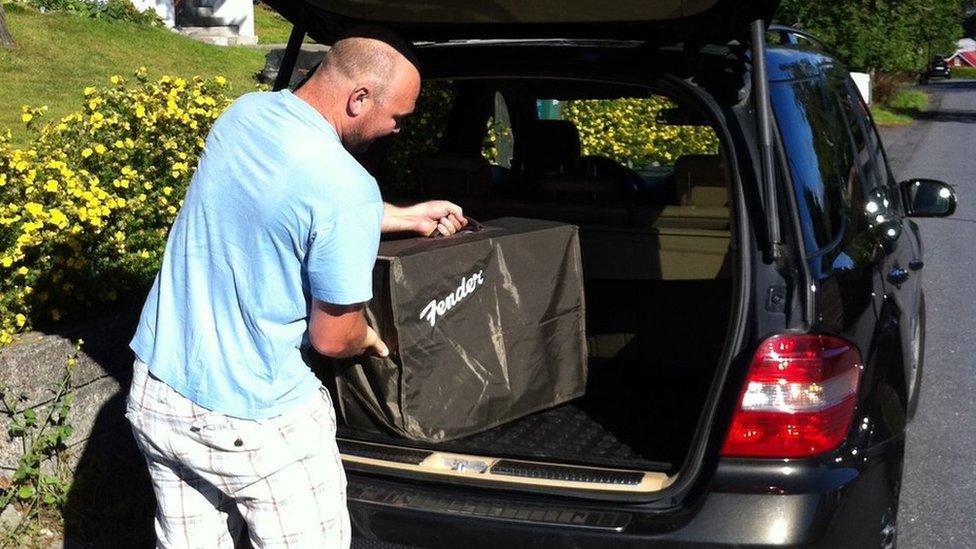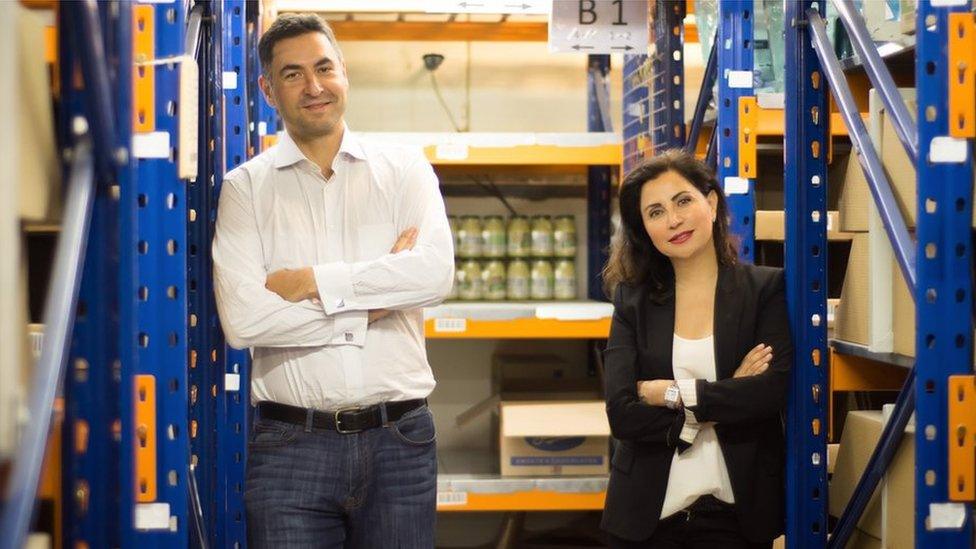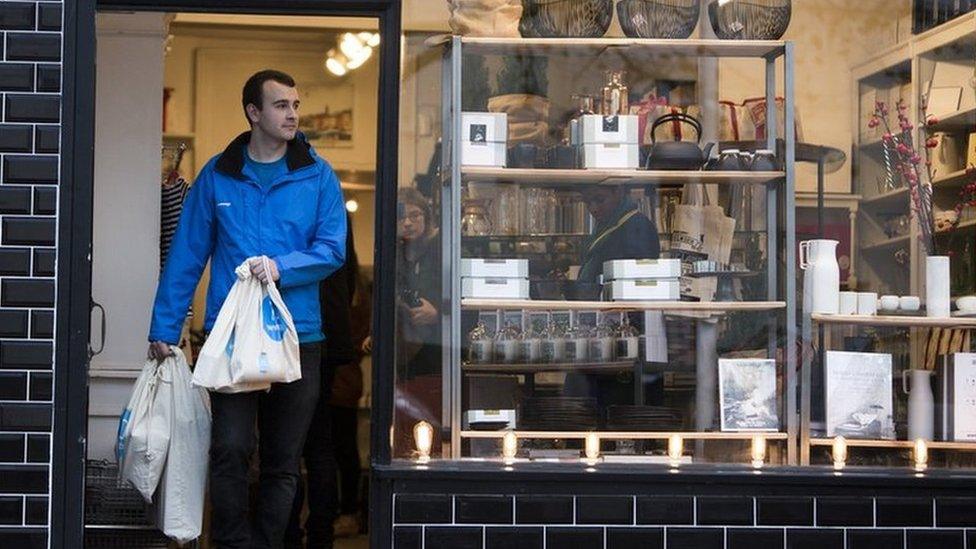How you could be Postman Pat for a day and earn extra cash
- Published

Cartoon characters Postman Pat and Mr Plod represent a bygone era in deliveries
A growing number of start-ups are trying to help retailers deliver goods to customers more quickly and at lower cost. But can they really compete with the big courier and postal firms?
It was a road accident in the Norwegian mountains that inspired the idea for start-up delivery company Nimber.
One of the founders was on his way to a ski-jumping competition near Lillehammer when he saw a postal truck had overturned on the road.
"No one was hurt, but all these cars were just passing by," says Nimber chief executive Ari Kestin, whose partner Knut Bjerke made the trip.
"He thought, why don't they stop and carry some of the parcels to their destinations? A light-bulb came on."
Nimber was launched soon after, joining a wave of new apps aimed at shaking up the delivery market.
The website connects people who want to send large, awkward-to-carry goods, with members of the public travelling in the same direction.
These "crowdsourced couriers" name their own price, Mr Kestin says, but are usually cheaper than using a traditional courier service or postal firm, such as FedEx or Royal Mail.

Nimber's crowd-sourced couriers often transport large goods
"If you're driving from London to Manchester anyway, you will probably accept a lower price to deliver a package than a big delivery firm would," he says.
"We are making use of spare capacity and allowing people to monetise their movements."
The site, whose main markets are Norway and the UK, has more than 40,000 registered "bringers" and 80,000 senders. It handles hundreds of deliveries a day of things like bikes, car parts and furniture.
So far it has focused on serving people selling second-hand goods on sites like e-Bay and Norway's finn.no, but it has just started working with several big retailers, including Norway's largest meat and eggs producer, Nortura.
"Nimber is a great choice because it is environmentally friendly and doesn't create more traffic or pollution," a Nortura spokeswoman tells the BBC.
But using members of the public to deliver goods does have its drawbacks.
Mr Kestin admits that his service may not be as economical as a traditional delivery service for smaller items.
More Technology of Business

Its crowdsourced couriers are not always available to handle deliveries, and, on occasion, pull out at the last minute - although "that's quite rare", he says.
This isn't stopping other firms experimenting with the crowdsourcing model.
Some, like Uber Rush, Deliveroo and Instacart are using crowdsourced couriers to deliver packages, groceries and hot food locally - often more cheaply and quickly than major couriers could.
Belgium postal giant Bpost and DHL are among those to have experimented with crowdsourced couriers. And Amazon launched its "citizen delivery" service Flex in 2015.
With global retail e-ecommerce sales forecast to rise 23% this year to $2.3tn (£1.8tn), it's not surprising start-ups are trying to muscle in on a delivery market still dominated by national postal services and courier firms like UPS, DHL, FedEx, Blue Dart and PostNL.
These account for more than 90% of e-commerce deliveries, not including food, estimates Alex le Roy, an analyst at consultancy Transport Intelligence.
"These start-ups are basically serving the needs that the larger delivery companies can't meet," he says.
"That's because typically, traditional postal companies can deliver packages more or less anywhere, but they can't do it quickly.
"And the big courier firms can deliver quickly, but charge much higher prices when they deliver to out-of-the-way places or carry awkwardly shaped goods."
Nimbler start-ups can also help smaller retailers reach new markets.

Idriss Al Rifai and Joy Ajlouny co-founded Middle East-based Fetchr
Fetchr, for example, is a Dubai-based delivery company aiming to connect retailers with around four billion people worldwide who live in places without street names or house numbers.
"There is this huge demand for online shopping in emerging markets, but many big retailers are facing the same problem," says Fetchr co-founder Idriss Al Rifai.
"How can you grow if you can't deliver large numbers of parcels?"
The firm uses a customer's smartphone GPS location as the address. As soon as one of Fetchr's couriers has picked up a package from a retailer, it notifies the customer, offering them a two-hour delivery slot.
The customer then shares their location with Fetchr.
"Fifteen minutes before the firm delivers, we will ask the customer to share their location again - and if they have moved elsewhere, that's fine," Mr Al Rifai says.
"Even when there is an address, people don't want to be pinned down for hours to receive a package."
The firm, which employs 2,000 of its own couriers, serves brands such as supermarket chain Carrefour and Gucci, in countries such as the United Arab Emirates, Egypt and Saudi Arabia.
It hopes to expand internationally, having raised $41m (£31m) in investment in May, but will face competition from the likes of the UK's What3Words and South Africa's WumDrop, which are also addressing the "lack-of-address" issue.

Weengs collects retailers' goods, packs and delivers them
Some start-ups, such as Red Stag Fulfilment in the US and UK-based Weengs, are offering one-stop-shop services aimed at taking the delivery hassle away from small businesses.
"Shipping companies expect you to have packed your items properly, have done an analysis of your shipping costs, and prepared your customs paperwork," explains Weengs co-founder Alex Christodoulou.
"But many small businesses don't have the expertise to do this efficiently - it costs time and money."
Weengs manages the whole shipping process from end-to-end, collecting your items unboxed and packing them at its warehouse in Kings Cross, London.
"We then measure your item with a laser and create a box exactly fitting the dimensions of your goods," says Mr Christodoulou.
This reduces costs because some delivery companies charge by volume, not weight, he says.
Big retailers sending lots of parcels can often negotiate bulk discounts on delivery costs. Smaller retailers can't. So Weengs pools its customers' orders and shops around between 10 to 30 courier firms to bring down costs, says Mr Christodoulou.
His firm has handled 200,000 orders since launch in 2015, but faces competition from more established comparison services, such as parcel2go.com.
"These firms are already re-distributing the share of delivery volume from traditional delivery companies to smaller ones and individuals," says e-commerce consultant Kunle Campbell.
"I think more delivery companies will adopt their approaches, and it could cut the costs of delivery across the board."
That will be music to the ears of all e-commerce entrepreneurs.
Follow Technology of Business editor Matthew Wall on Twitter, external and Facebook, external